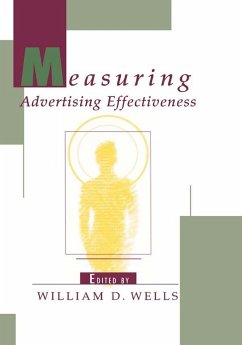
Deception In The Marketplace (eBook, PDF)
The Psychology of Deceptive Persuasion and Consumer Self-Protection
Versandkostenfrei!
Sofort per Download lieferbar
56,95 €
inkl. MwSt.
Weitere Ausgaben:

PAYBACK Punkte
28 °P sammeln!
This is the first scholarly book to fully address the topics of the psychology of deceptive persuasion in the marketplace and consumer self-protection. Deception permeates the American marketplace. Deceptive marketing harms consumers' health, welfare and financial resources, reduces people's privacy and self-esteem, and ultimately undermines trust in society. Individual consumers must try to protect themselves from marketers' misleading communications by acquiring personal marketplace deception-protection skills that go beyond reliance on legal or regulatory protections. Understanding the psyc...
This is the first scholarly book to fully address the topics of the psychology of deceptive persuasion in the marketplace and consumer self-protection. Deception permeates the American marketplace. Deceptive marketing harms consumers' health, welfare and financial resources, reduces people's privacy and self-esteem, and ultimately undermines trust in society. Individual consumers must try to protect themselves from marketers' misleading communications by acquiring personal marketplace deception-protection skills that go beyond reliance on legal or regulatory protections. Understanding the psychology of deceptive persuasion and consumer self-protection should be a central goal for future consumer behavior research.
The authors explore these questions. What makes persuasive communications misleading and deceptive? How do marketing managers decide to prevent or practice deception in planning their campaigns? What skills must consumers acquire to effectively cope with marketers' deception tactics? What does research tell us about how people detect, neutralize and resist misleading persuasion attempts? What does research suggest about how to teach marketplace deception protection skills to adolescents and adults?
Chapters cover theoretical perspectives on deceptive persuasion; different types of deception tactics; how deception-minded marketers think; prior research on how people cope with deceptiveness; the nature of marketplace deception protection skills; how people develop deception protection skills in adolescence and adulthood; prior research on teaching consumers marketplace deception protection skills; and societal issues such as regulatory frontiers, societal trust, and consumer education practices.
This unique book is intended for scholars and researchers. It should be essential reading for upper level and graduate courses in consumer behavior, social psychology, communication, and marketing. Marketing practitioners and marketplace regulators will find it stimulating and authoritative, as will social scientists and educators who are concerned with consumer welfare.
The authors explore these questions. What makes persuasive communications misleading and deceptive? How do marketing managers decide to prevent or practice deception in planning their campaigns? What skills must consumers acquire to effectively cope with marketers' deception tactics? What does research tell us about how people detect, neutralize and resist misleading persuasion attempts? What does research suggest about how to teach marketplace deception protection skills to adolescents and adults?
Chapters cover theoretical perspectives on deceptive persuasion; different types of deception tactics; how deception-minded marketers think; prior research on how people cope with deceptiveness; the nature of marketplace deception protection skills; how people develop deception protection skills in adolescence and adulthood; prior research on teaching consumers marketplace deception protection skills; and societal issues such as regulatory frontiers, societal trust, and consumer education practices.
This unique book is intended for scholars and researchers. It should be essential reading for upper level and graduate courses in consumer behavior, social psychology, communication, and marketing. Marketing practitioners and marketplace regulators will find it stimulating and authoritative, as will social scientists and educators who are concerned with consumer welfare.
Dieser Download kann aus rechtlichen Gründen nur mit Rechnungsadresse in A, B, BG, CY, CZ, D, DK, EW, E, FIN, F, GR, HR, H, IRL, I, LT, L, LR, M, NL, PL, P, R, S, SLO, SK ausgeliefert werden.













